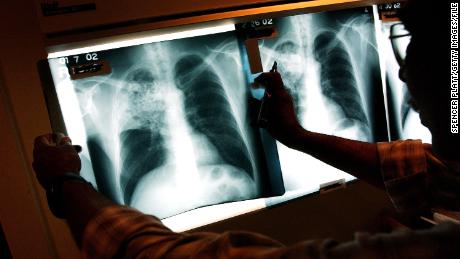Researchers found that countries, where many people have been given the vaccine, have had less mortality from Covid-19.
While that doesn't mean that BCG somehow reduces the risk of severe illness from a coronavirus infection, it fits in with other research that suggests BCG can boost people's immunity in general, and perhaps help against the coronavirus.
The World Health Organization has cautioned against the use of the BCG vaccine for coronavirus until more is known, but teams around the world are studying the possibility it may help.
Luis Escobar of Virginia Polytechnic Institute and colleagues used existing data to explore whether countries without a national BCG vaccination program have greater coronavirus mortality rates. In order to make a fair comparison, they accounted for factors such as population density, access to health care and response to Covid-19.
They found a strong correlation between BCG vaccination use and lowered Covid-19 mortality rates in socially similar European countries. Every 10% increase in the BCG index, which indicates the degree of universal BCG vaccination, was associated with a 10.4% reduction in Covid-19 mortality, they reported in the journal
Proceedings of the National Academy of Sciences."What distinguishes our work is that we were very careful in removing variables," said Carolina Barillas-Mury, a distinguished investigator with the National Institutes of Health who worked on the study."When we removed them, if this was not true, the association should have disappeared. Instead of disappearing, it became stronger and stronger -- more straightforward," she told CNN.
Nonspecific immunity from the vaccine
The finding is "remarkable, but not sufficient to establish causality," the team wrote. It's not enough to show for sure the BCG vaccine somehow protected people against coronavirus.
More than 100 years old, the BCG vaccine is used in many countries, not including the United States, and has been associated with reduced overall mortality rates in infants and children. There is strong evidence to suggest that the vaccine provides nonspecific immunity -- protection beyond tuberculosis. The vaccine's effects on adults have been inconsistent.
Other researchers have suggested that vaccines for polio and measles, mumps and rubella, may provide similar protections against lethal infections, including coronavirus.
The researchers caution that clinical trials are needed to prove the vaccine's impact on severe Covid-19. Initial clinical trials overseas are currently focused on health care workers on the front lines of the coronavirus fight.
A $10 million grant from the Bill and Melinda Gates Foundation in May bolstered clinical trials in Australia, Spain and The Netherlands, which will extend to 10,000 health care workers.
Dr Denise Faustman, director of immunobiology at Massachusetts General Hospital and associate professor of medicine at Harvard Medical School, hopes to begin clinical trials with her team in Boston as soon as possible.
Faustman has studied the off-target effects of the BCG vaccine for years. "BCG boosts the innate immune system," said Faustman, "So whenever you see any infectious disease, you can fight it off faster."
She says this is one of a number of recent studies, which have supported the potential of the BCG vaccine as a tool in the fight against coronavirus.
"The signal is really pretty strong that countries with prior BCG vaccination have protection from incidence and mortality," said Faustman, who added that there's even a possibility that the BCG vaccine could boost the efficacy of a coronavirus-specific vaccine, once it's created.
If the BCG vaccine's protection against coronavirus severity bears out with further research, it could have significant public health implications.
Most Asian countries have universal BCG vaccination programs, and the United States does not. According to the CDC, BCG is generally not recommended in the United States, because infection risk is low, the effectiveness of the vaccine can vary and it can potentially interfere with TB screening.
"It is possible that some of the social distancing roll-back strategies taken by Asian countries, in order to restart their economies, may not be effective in North America and western European countries, and could result in the second wave of infections," Escobar's team wrote.
The vaccine could conceivably be administered in countries that don't currently have a universal vaccination program.
"The nice thing is that it's given only once. It's potentially quite feasible to scale up production of the vaccine if it works and it's safe," said Dr Wafaa El-Sadr, a Columbia University professor of epidemiology and director of ICAP, a global health program.
Dr William Schaffner, an infectious disease specialist at the Vanderbilt University School of Medicine, who previously described using the BCG vaccine against coronavirus as "a Hail Mary pass," cautioned against putting too much stock in observational data collected across countries, since not all countries assess Covid-19 cases and deaths the same way.
"It's certainly a novel and provocative approach to trying to prevent this illness. We need all the help we can get," said Schaffner, who agrees that clinical trials are needed to truly assess the power of the BCG vaccine in fighting coronavirus.
"What we've seen are previews of coming attractions, as they say in the movie theatre," said Schaffner. "Let's wait for the movie."







Comments
Post a Comment